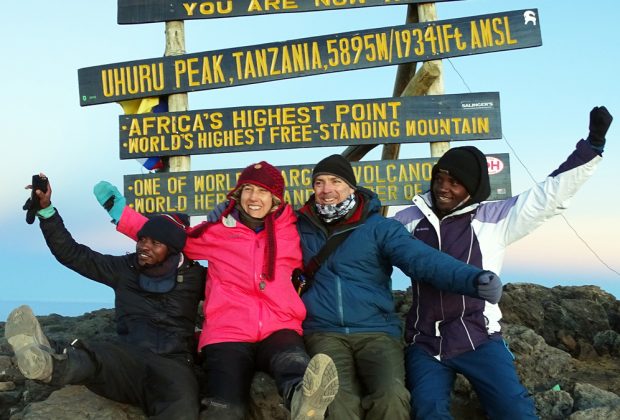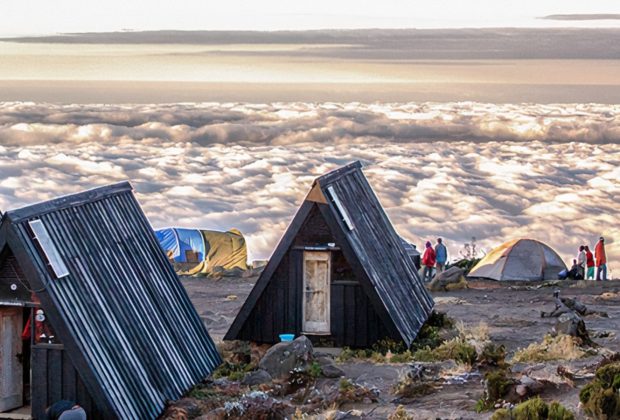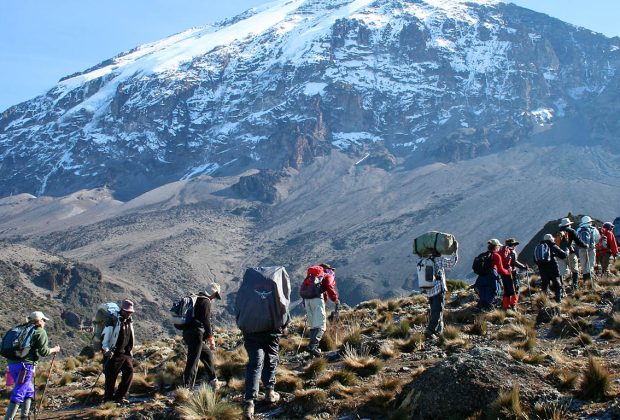8-Day Kilimanjaro Trek Via Lemosho Route



The Lemosho Route is one of the most scenic and diverse routes for trekking Mount Kilimanjaro, the highest peak in Africa. Spanning over 8 days, this route offers a gradual ascent, allowing trekkers ample time for acclimatization, which is crucial for a successful summit attempt.
Day 0 | Arrival
Upon arrival at Kilimanjaro International Airport (JRO), you will be met by our representative who will transfer you to Weru Weru River Lodge (https://www.weruweruriverlodge.com/) or a similar accommodation. The lodge offers all the essentials for a comfortable stay, including cozy rooms, hot water, friendly staff, a swimming pool, and Internet access. In the evening, there will be a briefing conducted by our managers to ensure you are fully prepared for the climb.
- Bed and Breakfast Note: Check-in starts at 1:00 PM.
Day 1: Trekking from Londorosi Gate to Mti Mkubwa Camp
In the morning, a guide and mountain support crew will meet you at the hotel for a briefing before departing by vehicle to Kilimanjaro National Park’s western entrance: Londorossi Gate (2,200 m). After obtaining climbing permits and registration, the trek begins towards the first camp of the route, Mti Mkubwa Camp (2,780 m). This day’s trek passes through rainforest, so raincoats are essential. Upon reaching camp, the support crew will set up tents and prepare lunch. An acclimatization hike towards Shira 1 Camp will be conducted in the afternoon, followed by dinner at Mti Mkubwa Camp.
- Elevation: 2,200 m to 2,780 m
- Hiking Time: 3-5 hours
- Distance: 6 km
- Difficulty: Low
- Habitat: Rainforest
Day 2: Trekking from Mti Mkubwa Camp to Shira 1 Camp
An early start leads to a gradual ascent to Shira 1 Camp (3,505 m), offering stunning views of Shira Plateau and Kibo Volcano. The trek is relatively easy and takes about 5-6 hours. Upon arrival, lunch will be provided, followed by relaxation or exploration of the surrounding area. Breakfast, lunch, and dinner will be served at the camp.
- Elevation: 2,780 m to 3,505 m
- Hiking Time: 5-6 hours
- Distance: 5 km
- Difficulty: Low
- Habitat: Meadows
Day 3: Trekking from Shira 1 Camp to Shira 2 Camp
Departing from Shira 1 Camp, a light trek leads to the second high altitude camp: Shira 2 Camp (3,900 m). The trek offers spectacular views of Mount Meru, weather permitting. Lunch will be served upon arrival, followed by an acclimatization hike towards Lava Tower Camp. Return to Shira 2 Camp for dinner and overnight stay.
- Elevation: 3,505 m to 3,900 m
- Hiking Time: 3-4 hours
- Distance: 7 km
- Difficulty: Low
- Habitat: Moorland
Day 4: Trekking from Shira 2 Camp to Lava Tower and Descend to Barranco Camp
After breakfast, depart Shira 2 Camp for Lava Tower (4,630 m), where lunch will be served. Spend 1-2 hours at Lava Tower for acclimatization before descending to Barranco Camp (3,960 m). Along the way, you’ll witness the impressive Barranco Wall. Arrive at Barranco Camp for dinner and overnight stay.
Note: In case of illness, the route may be adjusted, and the group may refrain from passing Lava Tower, reaching a maximum altitude of 4,400 meters.
- Elevation: 3,900 m to 4,630 m to 3,960 m
- Hiking Time: 6-8 hours
- Distance: 12 km
- Difficulty: Medium
- Habitat: Moorland
Day 5: Trekking from Barranco Camp to Karanga Camp
Start the day with an early ascent of the Barranco Wall, followed by a trek to Karanga Camp (4,035 m). Enjoy views of Kibo volcano and the surrounding area. Lunch will be served upon arrival, followed by an acclimatization hike towards Barafu Camp. Return to Karanga Camp for dinner and overnight stay.
Elevation: 3,960 m to 4,035 m Hiking Time: 4-5 hours Distance: 5 km Difficulty: Medium Habitat: Moorland
Day 6: Trekking from Karanga Camp to Barafu Camp
Depart Karanga Camp for Barafu Summit Camp (4,640 m), the starting point for the night summit of Uhuru Peak. After setting up camp, including tents and sleeping bags, take an acclimatization hike towards Kosovo Summit Camp (4,800 m) before returning to Barafu Camp for dinner and rest.
- Elevation: 4,035 m to 4,640 m
- Hiking Time: 4-5 hours
- Distance: 6 km
- Difficulty: Medium
- Habitat: Alpine desert
Day 7: Ascend to Uhuru Peak and Descend to Millennium Camp
Depart Barafu Camp at night for the summit of Uhuru Peak (5,895 m). Each pair of climbers will have a personal guide for the ascent. After reaching the summit, descend to Millennium Camp (3,820 m) for dinner and overnight stay.
Note: Pay attention to foot care during descent to avoid injuries.
Elevation: 4,640 m to 5,895 m to 3,820 m Hiking Time: 8-12 hours Distance: 15 km Difficulty: High Habitat: Arctic
Day 8: Descend from Millennium Camp to Mweka Gate
After breakfast, descend to Mweka Gate (1,650 m) for exit from the park. Gather for congratulations and certificate presentation before transferring back to Weru Weru Lodge.
- Elevation: 3,820 m to 1,650 m
- Hiking Time: 4-5 hours
- Distance: 12 km
- Difficulty: Low
- Habitat: Rainforest
Day 00: Departure
Rest at the hotel and transfer to the airport. Hotel check-out is at 11:00 AM. Late check-out is available for an extra fee for those with evening flights.
Inclusions:
Price Include:
* All transfers* Accommodation
* all trekking fees,
* All meals while on the Mountain
* Guides, Porters, cook salaries and park fees
* Quality Mess tents with table and chairs
* English speaking guide
* Sleeping bags
* Porters salary
• 3 meals in a day
• Mineral drinking water.
Price Exclude:* Tips,
* medical insurance cover
* all trekking personal gears
* alcohol
* all things of personal nature
What is Mount Kilimanjaro?
- Mount Kilimanjaro is the highest peak in Africa, located in Tanzania. It is a dormant volcano and one of the most iconic mountains in the world.
How tall is Mount Kilimanjaro?
- The summit of Mount Kilimanjaro, called Uhuru Peak, stands at an elevation of 5,895 meters (19,341 feet) above sea level.
How long does it take to climb Mount Kilimanjaro?
- The duration of a Kilimanjaro climb varies depending on the route chosen. Most climbs typically range from 5 to 9 days.
What are the different routes up Mount Kilimanjaro?
- There are several routes to the summit of Kilimanjaro, each with its own characteristics and scenery. Popular routes include the Marangu, Machame, Lemosho, Rongai, and Northern Circuit routes.
Is climbing Mount Kilimanjaro difficult?
- Climbing Kilimanjaro is challenging due to its high altitude, but it doesn’t require technical climbing skills. However, climbers should be physically fit and prepared for the rigors of high-altitude trekking.
Do I need a guide to climb Mount Kilimanjaro?
- Yes, it is mandatory to have a registered guide accompany you on your Kilimanjaro climb. Guides are essential for safety, navigation, and providing support throughout the trek.
When is the best time to climb Mount Kilimanjaro?
- The best times for climbing Kilimanjaro are during the dry seasons, which are typically from late June to October and from December to March. These months offer clearer skies and better trekking conditions.
What should I pack for climbing Mount Kilimanjaro?
- Essential items for climbing Kilimanjaro include proper clothing for varying temperatures, sturdy hiking boots, a good quality sleeping bag, trekking poles, personal medications, and other necessary gear as recommended by your tour operator.
What are the risks of climbing Mount Kilimanjaro?
- The main risks of climbing Kilimanjaro include altitude sickness, which can affect anyone regardless of fitness level, as well as other potential hazards such as extreme weather conditions and physical exhaustion.
Do I need to train before climbing Mount Kilimanjaro?
- Yes, it is highly recommended to undergo physical training and preparation before attempting to climb Kilimanjaro. This can include cardiovascular exercises, strength training, and hiking to build endurance and fitness levels.
